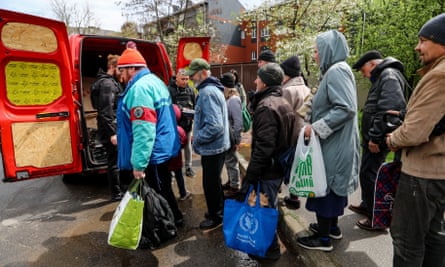Ukrainian authorities say Russian forces are “forcibly evacuating” civilians in the area of the Kherson region that they still occupy, a day after it was claimed Ukrainian forces had established a bridgehead on the east bank of the Dnipro River.
“I have information that the evacuation starts today [Sunday] with an excuse of protecting civilians from the consequences of heavy fighting in the area,” Oleksandr Samoylenko, the Ukrainian head of Kherson’s regional council, said. Russian troops were “trying to steal as much as they can” as they withdrew, he added.
The claim cannot be verified, but it comes amid an apparent increase in Ukrainian military activity in the south of the country which some analysts have interpreted as a potential precursor to Kyiv’s long anticipated counter-offensive.
Serhiy Khlan, another Ukrainian official in Kherson, said over the weekend that Wagner group fighters were helping Russian occupation officials impose control over the civilian population on the east bank of the Dnipro.
Ukraine’s southern military command meanwhile reported airstrikes in Kherson by four Russian Su-35 jets. Ukraine said buildings were hit with guided bombs, but did not specify the location of the strikes.
Attention has focused on Ukraine’s southern front around the key city of Kherson since Sunday’s report from the Institute for the Study of War, a US-based thinktank, which suggested Ukrainian forces had established positions on the east bank of the Dnipro, opposite Kherson in the area of a settlement called Dachy. The ISW made the claim after geolocating reports from Russian sources.
Analysts at the thinktank came to the conclusion after examining text messages and photos posted by “Russian military bloggers”.
The ISW also suggested Russian forces may no longer control islands in the Kinka and Chaika rivers, less than 500 metres north of Dachy.
The apparent Ukrainian progress follows months of low-level conflict in the Dnipro delta and along the Kinburn spit, a narrow sandy peninsula. Both sides have deployed crews in rigid inflatable boats in often unreported fights over the small islands that dot the river mouth and surrounding marshes.
The handful of reports that have emerged since the beginning of the year about the delta have painted a picture of bitter fighting for small and mainly uninhabited islands, some of which have changed hands several times. With the islands and the river threatened by artillery strikes from both sides, Russian and Ukrainian forces have lost boats in the fighting.

The Ukrainian military has asked for “patience” on reports of a possible offensive. A large-scale advance over the wide river under the threat of Russian strikes would be a large and difficult undertaking.
“The conditions of a military operation require silence until it is safe enough for our military,” a Ukrainian military spokesperson said, adding she could not confirm or deny the ISW’s report.
The reports of a potential Ukrainian advance in the south come nearly six months after Ukraine liberated Kherson city and the west bank of the Dnipro in November 2022.
According to the ISW’s most recent update, Kherson may be the most vulnerable area of Russian occupation along the long frontline.
“The Russian grouping in Kherson oblast is likely the most disorganised and undermanned in the entire theatre, highly likely mainly comprised of badly under-strength remnants of mainly mobilised units,” the thinktank said.
Speculation over Ukrainian advances in the south came as Russian authorities said they had repelled a drone attack on the port of Sevastopol in Moscow-annexed Crimea, adding that there was no damage or casualties.
It also came as audio emerged of the head of the Wagner mercenary group threatening to kill Ukrainian prisoners of war. Yevgeny Prigozhin was reacting to a Wagner-affiliated Telegram channel posting of an alleged recording of what it said were two Ukrainians deciding to shoot a Russian prisoner of war.
The channel did not say where the recording came from and there is no way of verifying its authenticity.
“We will kill everyone on the battlefield. Take no more prisoners of war!” Prigozhin said in an audio recording on Sunday “We don’t know the name of our guy shot by Ukrainians,” Prigozhin said, adding that under international law his group was obliged to “take care, treat, not hurt” any prisoners of war.

 1 year ago
132
1 year ago
132










 English (US)
English (US)